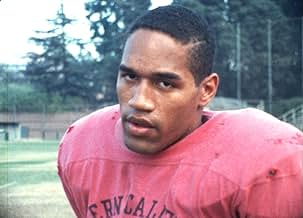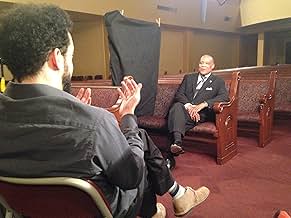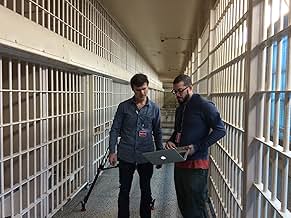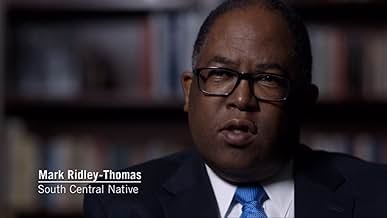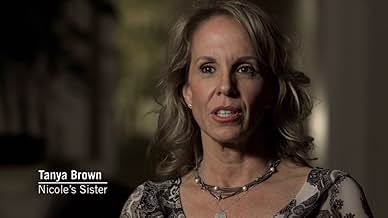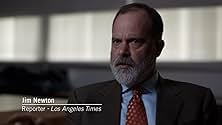A chronicle of the rise and fall of O.J. Simpson, whose high-profile murder trial exposed the extent of American racial tensions, revealing a fractured and divided nation.A chronicle of the rise and fall of O.J. Simpson, whose high-profile murder trial exposed the extent of American racial tensions, revealing a fractured and divided nation.A chronicle of the rise and fall of O.J. Simpson, whose high-profile murder trial exposed the extent of American racial tensions, revealing a fractured and divided nation.
- Won 1 Oscar
- 49 wins & 35 nominations total
Harry Edwards
- Self - Activist
- (as Dr. Harry Edwards)
John McKay
- Self - USC Head Coach
- (archive footage)
Harry Alfred Khasigian
- Self - USC Teammate
- (as Fred Khasigian)
Mark Ridley Thomas
- Self - South Central Community Leader
- (as Mark Ridley-Thomas)
Featured reviews
This is one of the best documentaries i have ever seen. After recently watching the "not as good" "The People vs OJ Simpson" with John Travolta and Cuba Gooding Jr. This documentary was definitely a breath of fresh air.
The depth of it, the attention to all the details, the interviews, the massive amount of research that has gone into it. It is massive, to make this documentary is a tremendous undertaking, and is nothing but outstanding. It manages to keep you nailed to your seat for almost 8 hours, you sit and watch as you shake your head in disbelief. This documentary is nothing short of a masterpiece.
Even though most of us have heard about this story time and time again, and made up our minds years ago, the documentary gives you a new fresh look at things, you start from the very beginning. We follow OJ all the way back to when he started to become noticed as a good football player, and we follow him all the way to his fall from the top of the mountain.
The documentary does not take sides, which would be a terrible decision for any director to pursue, so after you have seen it, you have the ability to make up your own mind. Did OJ do it? Or did he not? I was never in doubt he was guilty of killing his wife and her friend, and this documentary didn't strengthen my opinion or weaken it, but it made me feel so sorry for Nicole Simpson and what she had been through, it is truly heartbreaking. I sit her and feel i wish i could go back in time and save her.
All the beatings, the abuse and the terror she had to endure through the years, she was the mother of his children, and was slaughtered as a pig, left to bleed out alongside her friend who were also bleeding out. And the guy who did it, got away free with murder. Horrible, just horrible.
The documentary does not filter this by censuring crime scene photos, no it shows them in close ups. To see what rage a person must have felt the moment he slices a woman's throat right in to her neck while she is still alive.
Now this is graphic, it is, but i think the documentary does it right by showing this to us. This is about the trial of the century, where a famous man faces the most famous justice system in the world. Will this justice system judge him based on the evidence?. Well most of us already know the outcome.
But why did this end the way it did?. There are details we have never seen or heard before, there are people that has not been able to speak out properly, this documentary has gathered key people from OJ's life all the way back to his childhood, and it builds an image of him, detailed, slowly, but never boring, it shows us who OJ really was, and how he became that way.
All the years after the murder of his wife, and OJ did nothing to find "the real killer". He was laughing and dancing, he had custody of his children, he lived a good life in a very nice house, and lived the dream as most others can't even dream of.
Watching all these clips of him, doing all this, and celebrating life as it was himself that was the god of it all, made me feel deeply sad for Nicole. If only someone had prevented this, if only someone could have done something.
I can never get those images of Nicole and Ron's crime scene photos out of my head. But i had to see them to feel how i do now.
Amazing documentary, highly recommended, both for those who know about the case and followed it, and for those who know nothing about it. See it, learn from it, and take in that this can actually happen.
My verdict is : 10/10
The depth of it, the attention to all the details, the interviews, the massive amount of research that has gone into it. It is massive, to make this documentary is a tremendous undertaking, and is nothing but outstanding. It manages to keep you nailed to your seat for almost 8 hours, you sit and watch as you shake your head in disbelief. This documentary is nothing short of a masterpiece.
Even though most of us have heard about this story time and time again, and made up our minds years ago, the documentary gives you a new fresh look at things, you start from the very beginning. We follow OJ all the way back to when he started to become noticed as a good football player, and we follow him all the way to his fall from the top of the mountain.
The documentary does not take sides, which would be a terrible decision for any director to pursue, so after you have seen it, you have the ability to make up your own mind. Did OJ do it? Or did he not? I was never in doubt he was guilty of killing his wife and her friend, and this documentary didn't strengthen my opinion or weaken it, but it made me feel so sorry for Nicole Simpson and what she had been through, it is truly heartbreaking. I sit her and feel i wish i could go back in time and save her.
All the beatings, the abuse and the terror she had to endure through the years, she was the mother of his children, and was slaughtered as a pig, left to bleed out alongside her friend who were also bleeding out. And the guy who did it, got away free with murder. Horrible, just horrible.
The documentary does not filter this by censuring crime scene photos, no it shows them in close ups. To see what rage a person must have felt the moment he slices a woman's throat right in to her neck while she is still alive.
Now this is graphic, it is, but i think the documentary does it right by showing this to us. This is about the trial of the century, where a famous man faces the most famous justice system in the world. Will this justice system judge him based on the evidence?. Well most of us already know the outcome.
But why did this end the way it did?. There are details we have never seen or heard before, there are people that has not been able to speak out properly, this documentary has gathered key people from OJ's life all the way back to his childhood, and it builds an image of him, detailed, slowly, but never boring, it shows us who OJ really was, and how he became that way.
All the years after the murder of his wife, and OJ did nothing to find "the real killer". He was laughing and dancing, he had custody of his children, he lived a good life in a very nice house, and lived the dream as most others can't even dream of.
Watching all these clips of him, doing all this, and celebrating life as it was himself that was the god of it all, made me feel deeply sad for Nicole. If only someone had prevented this, if only someone could have done something.
I can never get those images of Nicole and Ron's crime scene photos out of my head. But i had to see them to feel how i do now.
Amazing documentary, highly recommended, both for those who know about the case and followed it, and for those who know nothing about it. See it, learn from it, and take in that this can actually happen.
My verdict is : 10/10
(RATING: ☆☆☆☆½ out of 5)
THIS FILM IS HIGHLY RECOMMENDED.
IN BRIEF: A compelling documentary that focuses on a city on fire and the "Trial of the Century".
GRADE: B+
SYNOPSIS: The O.J. Simpson trial and the many factors influencing the verdict and its aftermath.
JIM'S REVIEW: There is a fascinating 7½ hour documentary that premiered on ABC and ESPN television stations this past week and is currently streaming which is worth your attention. O.J.: Made in America may be overly long and in some need of judicious editing in parts, but it is a fascinating in-depth look back at the "Trial of the Century" and its repercussions that are relevant today.
The brutal murder of Simpson's ex-wife, Nicole Brown and her friend, Ron Goldman, on June 12, 1994 immediately made headlines and spawned a media circus, showing the incompetent handling of the case by the LAPD and District Attorney's office, and the unethical maneuverings of the prosecuting team, led by Robert Shapiro and Johnnie Cochran, to free their client and exploit the legal system.
Documentarian Ezra Edelman culled over hours of archival footage, news segments, and interviews (both then and now) to create a timely chronicle of the O.J. Simpson trial and the political unrest of a racially-divided city. He delves into the numerous 911 calls prior to the murder and Nicole's personal diary with many passages about the physical abused she suffered in her marriage to this volatile celebrity. Mr. Edelman astutely assembles new interviews with many of the people involved with the case which brings us access to observe a broken judicial system in retrospect.
The documentary shares a balanced look at the man and equally at the era. It begins with a before-and-after approach, first showing this famous incarcerated man and providing flashbacks depicting an up-and-coming young college athlete beginning his exulted career. The effect is startling. Seeing O.J. in his prime sheds new light of the man and his later fall from grace. We learn about his homophobia toward his gay estranged father, his gift for talking himself out of situations at an early age (which may have given him a false sense of security throughout his life), his lack of involvement with Civil Right issues, his innate kindness to his teammates, and the tragic death of his daughter which ended his first marriage, events that were unknown to this reviewer. We also hear of O.J's constant womanizing, his insatiable ego, his life cavorting with the rich and famous of Brentwood, his sexist and privileged attitude, and his intense jealousy and violence toward his second wife that went unheeded. Fame and wealth brought him the good life and finally corrupted the man.
But the other character in this multi-faceted tragedy is L.A. itself and the racism and injustice by the police force. Mr. Edelman's need to parallel these two tangents with the murder trial itself to make his film more complete is noteworthy, but it also gives his documentary too much latitude into this area. The film meanders into the prejudice and hate that was so rampant at the time, with the Watts riots, the Rodney King beating, and the senseless murders of African- Americans in the hands of the LAPD as the backdrop to the subsequent trial. Perhaps too much time is spent on this topic (and the famous Bronco chase) which is overstated but essential filler. Here is an accused man who erased race from his own life only to rely on it later for his freedom. That is just one irony among many. (Another is Simpson's ability to pay for his legal defense via selling autographed sports memorabilia when still being incarcerated for these murders.)
The numerous interviews and comments with former friends and colleagues are enlightening and seeing the actual cast of characters that played their parts in the trial is riveting. Particularly memorable are the words of attorney Marcia Clark, a still grieving Fred Goldman, former head D.A. Gil Garcetti, prosecuting lawyer Carl Douglas, detectives Tom Lange and Mark Fuhrman, and former friends Robin Greer, Ron Shipp, and Joe Bell. Their personal knowledge adds important details to this complicated story.
Probably the most interesting aspect about the film is the mixed emotions and personal biases felt by the jurors. (Deliberations of the verdict lasted a few hours with one member, a former Black Panther, saluting the plaintiff upon exiting the jury box.) That, and the questionable decisions handed down by the judge, Lance Ito, throughout the trial helped the prosecution play their successful "race card". Unable to see certain evidence (O.J. prior violent activities, the 911 calls, the graphic blood scene photos, the direct DNA blood connection), and falling for the grandstanding antics of that bloodied glove and a pre-staged jury's visit to Simpson's home completely changed for maximum African-American emphasis, the outcome seemed like a sure acquittal from the start. (That latter stunt by the prosecution team alone would have created a mistrial today.) O.J. may have been found not guilty, (no spoiler here), but the LAPD and their botched investigation were the ones really on trial.
O.J.: Made in America is a powerful documentary and one of the year's best films. (One would hope that it would qualify for Academy Award consideration next year, although it eluded any theatrical release as yet.) The film depicts an America filled with racial hate and anger. It shines a spotlight on domestic abuse issues. It highlights our fascination with celebrity worship and a willingness to give free rein to the lifestyle of the rich and famous while two innocent people receive no sign of justice. Mr. Edelman's epic achievement may give these victims their dues and finally a bit of justice as well.
THIS FILM IS HIGHLY RECOMMENDED.
IN BRIEF: A compelling documentary that focuses on a city on fire and the "Trial of the Century".
GRADE: B+
SYNOPSIS: The O.J. Simpson trial and the many factors influencing the verdict and its aftermath.
JIM'S REVIEW: There is a fascinating 7½ hour documentary that premiered on ABC and ESPN television stations this past week and is currently streaming which is worth your attention. O.J.: Made in America may be overly long and in some need of judicious editing in parts, but it is a fascinating in-depth look back at the "Trial of the Century" and its repercussions that are relevant today.
The brutal murder of Simpson's ex-wife, Nicole Brown and her friend, Ron Goldman, on June 12, 1994 immediately made headlines and spawned a media circus, showing the incompetent handling of the case by the LAPD and District Attorney's office, and the unethical maneuverings of the prosecuting team, led by Robert Shapiro and Johnnie Cochran, to free their client and exploit the legal system.
Documentarian Ezra Edelman culled over hours of archival footage, news segments, and interviews (both then and now) to create a timely chronicle of the O.J. Simpson trial and the political unrest of a racially-divided city. He delves into the numerous 911 calls prior to the murder and Nicole's personal diary with many passages about the physical abused she suffered in her marriage to this volatile celebrity. Mr. Edelman astutely assembles new interviews with many of the people involved with the case which brings us access to observe a broken judicial system in retrospect.
The documentary shares a balanced look at the man and equally at the era. It begins with a before-and-after approach, first showing this famous incarcerated man and providing flashbacks depicting an up-and-coming young college athlete beginning his exulted career. The effect is startling. Seeing O.J. in his prime sheds new light of the man and his later fall from grace. We learn about his homophobia toward his gay estranged father, his gift for talking himself out of situations at an early age (which may have given him a false sense of security throughout his life), his lack of involvement with Civil Right issues, his innate kindness to his teammates, and the tragic death of his daughter which ended his first marriage, events that were unknown to this reviewer. We also hear of O.J's constant womanizing, his insatiable ego, his life cavorting with the rich and famous of Brentwood, his sexist and privileged attitude, and his intense jealousy and violence toward his second wife that went unheeded. Fame and wealth brought him the good life and finally corrupted the man.
But the other character in this multi-faceted tragedy is L.A. itself and the racism and injustice by the police force. Mr. Edelman's need to parallel these two tangents with the murder trial itself to make his film more complete is noteworthy, but it also gives his documentary too much latitude into this area. The film meanders into the prejudice and hate that was so rampant at the time, with the Watts riots, the Rodney King beating, and the senseless murders of African- Americans in the hands of the LAPD as the backdrop to the subsequent trial. Perhaps too much time is spent on this topic (and the famous Bronco chase) which is overstated but essential filler. Here is an accused man who erased race from his own life only to rely on it later for his freedom. That is just one irony among many. (Another is Simpson's ability to pay for his legal defense via selling autographed sports memorabilia when still being incarcerated for these murders.)
The numerous interviews and comments with former friends and colleagues are enlightening and seeing the actual cast of characters that played their parts in the trial is riveting. Particularly memorable are the words of attorney Marcia Clark, a still grieving Fred Goldman, former head D.A. Gil Garcetti, prosecuting lawyer Carl Douglas, detectives Tom Lange and Mark Fuhrman, and former friends Robin Greer, Ron Shipp, and Joe Bell. Their personal knowledge adds important details to this complicated story.
Probably the most interesting aspect about the film is the mixed emotions and personal biases felt by the jurors. (Deliberations of the verdict lasted a few hours with one member, a former Black Panther, saluting the plaintiff upon exiting the jury box.) That, and the questionable decisions handed down by the judge, Lance Ito, throughout the trial helped the prosecution play their successful "race card". Unable to see certain evidence (O.J. prior violent activities, the 911 calls, the graphic blood scene photos, the direct DNA blood connection), and falling for the grandstanding antics of that bloodied glove and a pre-staged jury's visit to Simpson's home completely changed for maximum African-American emphasis, the outcome seemed like a sure acquittal from the start. (That latter stunt by the prosecution team alone would have created a mistrial today.) O.J. may have been found not guilty, (no spoiler here), but the LAPD and their botched investigation were the ones really on trial.
O.J.: Made in America is a powerful documentary and one of the year's best films. (One would hope that it would qualify for Academy Award consideration next year, although it eluded any theatrical release as yet.) The film depicts an America filled with racial hate and anger. It shines a spotlight on domestic abuse issues. It highlights our fascination with celebrity worship and a willingness to give free rein to the lifestyle of the rich and famous while two innocent people receive no sign of justice. Mr. Edelman's epic achievement may give these victims their dues and finally a bit of justice as well.
A blistering and engrossing documentary about the O.J. Simpson murder trial that explores how the sensational event became a symbol for the racial tension that was just waiting to boil over in Los Angeles in particular and the United States in general.
I was in college when the O.J. story happened, and I only half paid attention to it at the time, so it was fascinating for me to watch this film that seemed like a new version of an old story. The film makes no attempt to hide the filmmakers' opinion that the innocent verdict in the case was a gross miscarriage of justice, but I have to admit that, though I've always believed O.J. was guilty too, I would probably have acquitted him myself as a juror based on the dismal way the prosecution handled the case.
But the grossest outrage about the whole event -- I felt it at the time and I felt it again watching the movie -- is that the murders that made the whole trial necessary in the first place were forgotten amid the racial baiting and the defense's willingness to capitalize on the emotions of an angry and disenfranchised black community.
A seven-hour documentary may sound daunting at the beginning, but I challenge you not to binge watch it.
Winner of the 2016 Oscar for Best Documentary Feature, a complete no brainer of a win.
Grade: A
I was in college when the O.J. story happened, and I only half paid attention to it at the time, so it was fascinating for me to watch this film that seemed like a new version of an old story. The film makes no attempt to hide the filmmakers' opinion that the innocent verdict in the case was a gross miscarriage of justice, but I have to admit that, though I've always believed O.J. was guilty too, I would probably have acquitted him myself as a juror based on the dismal way the prosecution handled the case.
But the grossest outrage about the whole event -- I felt it at the time and I felt it again watching the movie -- is that the murders that made the whole trial necessary in the first place were forgotten amid the racial baiting and the defense's willingness to capitalize on the emotions of an angry and disenfranchised black community.
A seven-hour documentary may sound daunting at the beginning, but I challenge you not to binge watch it.
Winner of the 2016 Oscar for Best Documentary Feature, a complete no brainer of a win.
Grade: A
A detailed view of the life of the infamous O.J. Simpson starting with his NFL carrier and his rise to an American icon to his downfall caused by one night in 1994. An excellent documentary series executed to perfection.
There are many documentaries out there- particularly on Netflix- that are just far too long. I can understand why, because owing to the way streaming services work, it's surely tempting to extend a documentary beyond the standard two-ish hours into a multi-part 6-10 hour miniseries, because that keeps viewers hooked into whatever service they're subscribed to. In all honesty, I'm personally a little tired of this approach, particularly because I think most subjects can be thoroughly explored within the length of a movie, if the director and editor and everyone else involved know what they're doing.
This naturally made me very cautious to watch OJ: Made In America, despite how critically acclaimed it was. While it was released in a very limited theatrical release- and won an Oscar for Best Documentary before the Academy changed their rules to disqualify lengthy works broken into parts- it did look to me like it would be another true crime miniseries that would draw itself out longer than necessary. Furthermore, I was worried it would be tacky and disrespectful the way many documentary miniseries are; if you're teasing and using real life tragic events as cliffhangers or hooks for viewers, for example, I think that's pretty twisted.
Thankfully, OJ: Made In America managed to transcend all of its similar contemporaries. This is miles better than something like Making A Murderer or any other show trying to chase its success; it goes in depth and uses its incredibly long runtime to tell a huge story and cover many, many topics in gripping and compelling detail. It's much more than a story about the double murder that OJ Simpson was accused of committing, and it's even more than just a documentary about OJ Simpson. The hint's in the title: it uses the story of Simpson to tell a huge, almost epic story about crime, race relations, and societal conflict throughout the last few decades of history.
It's hard to unpack everything, but you will find something interesting and intensely thought provoking within this documentary. It's not so much about trying to prove whether Simpson committed the crime or not, and moreso just giving as many points of view, opinions, and insights as possible. It's superbly edited, and flows in a way where despite all the information, you never get lost or confused. And furthermore, despite the risk of information overload, you never really get bored either. Despite watching this in chunks, I could have happily digested the entire seven and a half hours in one sitting, and if I ever rewatch it one day maybe I will view it in that way.
It's hard to come up with too many flaws. I'm conflicted over the use of graphic crime scene and autopsy photos in Part 4 of the documentary- some viewers may not understand the intensity and viciousness of the murder with verbal descriptions alone, but I feel like some people are appropriately disturbed with just picturing the aftermath in their head, and for those people, seeing the images themselves may feel like overkill. As such, I understand why those photos were included, but personally don't feel like I needed to be exposed to them. And I mean, could it have been six and a half hours instead of seven and a half? It's almost silly to think about that as a flaw, so I'm not sure it is, but at the same time... maybe it could've got more or less the same thing across?
I guess I'm struggling to think of flaws, or justify why I got this to 9/10 but not 10/10. On a rewatch, I may realise that this is about as good as documentaries can get, and raise the rating. For now, I can say that it's truly excellent and among the best documentaries I've ever seen, regardless of whether you choose to watch it as a miniseries or an extremely long feature.
Regardless of your thoughts on OJ Simpson and the infamous court case he was involved in, you will find things to appreciate, fixate on, and ponder throughout this incredibly impressive and borderline 'epic' documentary.
This naturally made me very cautious to watch OJ: Made In America, despite how critically acclaimed it was. While it was released in a very limited theatrical release- and won an Oscar for Best Documentary before the Academy changed their rules to disqualify lengthy works broken into parts- it did look to me like it would be another true crime miniseries that would draw itself out longer than necessary. Furthermore, I was worried it would be tacky and disrespectful the way many documentary miniseries are; if you're teasing and using real life tragic events as cliffhangers or hooks for viewers, for example, I think that's pretty twisted.
Thankfully, OJ: Made In America managed to transcend all of its similar contemporaries. This is miles better than something like Making A Murderer or any other show trying to chase its success; it goes in depth and uses its incredibly long runtime to tell a huge story and cover many, many topics in gripping and compelling detail. It's much more than a story about the double murder that OJ Simpson was accused of committing, and it's even more than just a documentary about OJ Simpson. The hint's in the title: it uses the story of Simpson to tell a huge, almost epic story about crime, race relations, and societal conflict throughout the last few decades of history.
It's hard to unpack everything, but you will find something interesting and intensely thought provoking within this documentary. It's not so much about trying to prove whether Simpson committed the crime or not, and moreso just giving as many points of view, opinions, and insights as possible. It's superbly edited, and flows in a way where despite all the information, you never get lost or confused. And furthermore, despite the risk of information overload, you never really get bored either. Despite watching this in chunks, I could have happily digested the entire seven and a half hours in one sitting, and if I ever rewatch it one day maybe I will view it in that way.
It's hard to come up with too many flaws. I'm conflicted over the use of graphic crime scene and autopsy photos in Part 4 of the documentary- some viewers may not understand the intensity and viciousness of the murder with verbal descriptions alone, but I feel like some people are appropriately disturbed with just picturing the aftermath in their head, and for those people, seeing the images themselves may feel like overkill. As such, I understand why those photos were included, but personally don't feel like I needed to be exposed to them. And I mean, could it have been six and a half hours instead of seven and a half? It's almost silly to think about that as a flaw, so I'm not sure it is, but at the same time... maybe it could've got more or less the same thing across?
I guess I'm struggling to think of flaws, or justify why I got this to 9/10 but not 10/10. On a rewatch, I may realise that this is about as good as documentaries can get, and raise the rating. For now, I can say that it's truly excellent and among the best documentaries I've ever seen, regardless of whether you choose to watch it as a miniseries or an extremely long feature.
Regardless of your thoughts on OJ Simpson and the infamous court case he was involved in, you will find things to appreciate, fixate on, and ponder throughout this incredibly impressive and borderline 'epic' documentary.
Did you know
- TriviaDirector Ezra Edelman struggled on the decision to include the forensic photos of the bodies of Nicole Brown Simpson and Ron Goldman, but ultimately decided to edit them in to remind the audience that the trial was meant to be about a horrific double homicide instead of the discussion about race and corrupt law enforcement that it ultimately progressed into.
- GoofsRobert Shapiro says in an interview with Barbara Walters that O.J. Simpson was found innocent. Simpson was found "not guilty", not "innocent".
- Quotes
O.J. Simpson: [referring to his refusal to participate in the boycott of 1968 Summer Olympics along with other prominent African American athletes] I'm not black, I'm O.J.
- SoundtracksHollywood Swinging
Written by Robert 'Kool' Bell (uncredited), Ronald Bell (uncredited), George 'Funky' Brown (uncredited), Robert 'Spike' Mickens (uncredited), Claydes Smith (uncredited), Dennis D.T. Thomas (uncredited) and Ricky Westfield (uncredited)
Performed by Kool & The Gang
- How long is O.J.: Made in America?Powered by Alexa
Details
- Release date
- Country of origin
- Official site
- Language
- Also known as
- 辛普森:美國製造
- Production companies
- See more company credits at IMDbPro
Contribute to this page
Suggest an edit or add missing content


